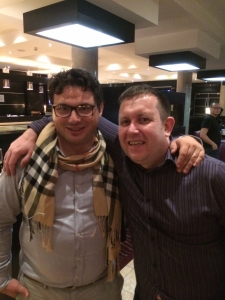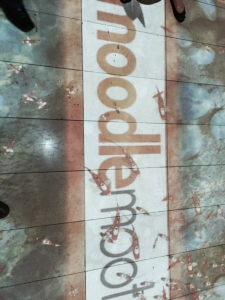Having just returned from the Moodle Moot in Dublin, the Moodle community is as strong as ever. At the Moot at DCU, Martin Dougiamas launched the Moodle Association to the community, to help accelerate the product roadmap of Moodle. This new membership organisation will allow individuals, universities and others to finance new product features for Moodle whilst helping to steer the product roadmap. There will also be a new board for the Moodle Association which will include an elected chair.
One of the big themes for the Moodle Moot was “Learning Analytics”, and Dr Bart Rienties (Reader in Learning Analytics at the Institute of Educational Technology at the Open University) gave his keynote speech on his research in this area. Learning Analytics are important to try and improve learning outcomes but also to ensure the retention and further engagement of students. What is needed is a dialogue between the teacher and student online. The real driver is feedback, and this is needed for a personalised approach. We need to map out what a successful student does in terms of their learning journey. What are the stronger guiding paths? What is the gateway which leads to success? What are the demographics of the students? What is the VLE activity and is this activity declining?
Once you look at the analytics over time, you can go back to the future. This is why learning design is so important: The modules with more communication and which involve finding more information are the ones students tend to find more engaging. However, courses with lots of assimilated activities lead to a higher drop-out rate. There appears to be more positive evidence than negative, showing that Learning Analytics can really help students fulfil their potential.
Gavin Henrik organised this year’s Moot, and he conducted a workshop on Learning Analytics. He talked about the need to have actionable reports which are useful. During his session we were asked to come up with four questions and present this back to the group.
Our group included representatives from King’s College London and a Danish university. We came up with four main questions:
- What is my learning style?
- What is my teaching style?
- What percentage of people are using the VLE?
- What gaps are there?
On the issue of gap-analysis we thought it would be good to develop a Moodle plugin called the Pareto Plugin. Pareto’s law states that 20% of the students will deliver 80% of the results. It therefore follows that it is 20% of the teachers creating the most engaging courses, and 20% of the students using Moodle the most. We thought it could be a clever idea to notify the remaining 80%, as graphed using Learning Analytics, telling them how the top 20% are learning and to share this best practice. How often are the top 20% accessing the VLE? What do the top 20% of students, with the best results, do in terms of online learning habits.
One of the disadvantages of Learning Analytics is that we do not get to see how the students are working in the offline world. If someone doesn’t log on for a while there could be other external factors outside of Moodle’s knowledge, contributing positively or negatively to a student’s education. Artificial intelligence and predictive analytics is a controversial topic, and the idea that a student’s grade in three years’ time could be predicted is one I find scary. However, used in the correct, ethical way, Learning Analytics should inform better course design, learning experience and allow teachers to focus on areas of greatest need. We need to follow the trends and patterns to optimise learning outcomes. Let’s remember: don’t create a report unless there is a recommended course of action contained within it!



